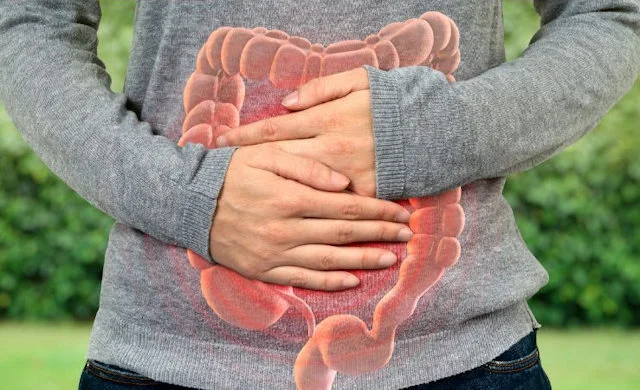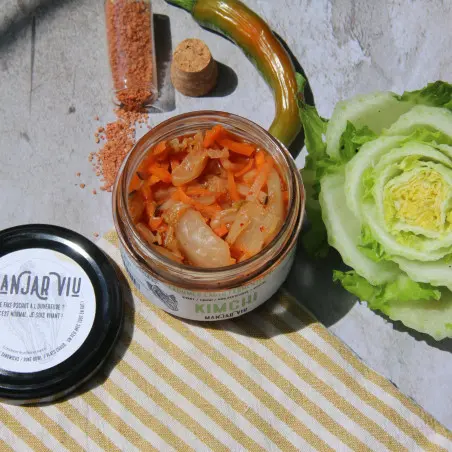Mucoid plaque is a topic that is garnering increasing interest in the field of gut health. Often overlooked, this accumulation of waste in our digestive system can have significant consequences on our overall well-being. In this article, we will explore what exactly mucoid plaque is, its effects on our body, and how a living food diet can play a key role in its prevention and elimination.
After reading this article, you will have:
- a clear understanding of what the mucoid plaque is,
- knowledge about its impact on gut health,
- information on the link between the mucoid plaque and nutrient assimilation,
- practical tips for promoting a healthy gut flora,
- tips for incorporating raw food into your daily life.

Definition and formation of the mucoid plaque
The mucoid plaque, often unknown to the general public, is a phenomenon that is increasingly attracting the interest of natural health professionals. It is an accumulation of waste, sticky substances like mucus, and undigested food residues that gradually forms on the walls of the intestines. This viscous and sticky layer can thicken over time, potentially hindering the proper functioning of our digestive system.
The formation of the mucoid plaque is closely linked to our modern lifestyle and dietary habits. Our current diet, often rich in processed foods, low in fiber, and difficult to digest, greatly contributes to this phenomenon. These foods, when not properly assimilated, can leave residues that gradually accumulate in our intestines, thus forming this controversial layer.
It is important to note that the concept of mucoid plaque is a subject of debate within the scientific community. Some alternative medicine practitioners support its existence and impact on health, while others question its physiological reality. Nevertheless, the idea of waste accumulation in our digestive system raises pertinent questions about our gut health and the importance of a balanced diet.
Composition of the mucoid plaque
The mucoid plaque is a complex accumulation of various elements in our digestive system. Its composition can vary, but it is generally made up of a mixture of undigested food residues, mucus, dead cells, and sometimes even parasites. This viscous layer gradually forms on the intestinal walls, potentially reaching several millimeters in thickness over time.
The main types of undigested foods that contribute to the formation of mucoid plaque are:
- processed foods high in saturated fats and refined sugars,
- animal proteins in excess, particularly difficult to digest,
- foods containing gluten, which can be irritating for some people,
- Dairy products, often poorly tolerated by many individuals.
The accumulation of these residues occurs progressively and insidiously. Initially, the layer is thin and almost imperceptible. However, over time and with an inadequate diet, successive layers can build up and thicken, which can hinder nutrient absorption and disrupt the normal functioning of the intestine.
It is interesting to note that certain foods, such as chia seeds or psyllium, can help naturally cleanse this buildup. These foods, rich in soluble fibers, form a gel upon contact with water that can help gently "sweep" the intestinal walls.
The accumulation of this infamous mucoid plaque is not a uniform process. It can vary depending on various individual factors such as diet, stress, physical activity, and even genetics. Some people may be more prone to developing significant mucoid plaque, while others naturally maintain a cleaner digestive system.
It is crucial to understand that the formation of mucoid plaques is not an inevitable process. By adopting a balanced diet, rich in fiber and whole foods, and maintaining a healthy lifestyle, it is possible to limit its accumulation and even promote its natural elimination.
Although the concept of mucoid plaque is still debated in some medical circles, many natural health practitioners observe significant improvements in their patients after intestinal cleansing protocols. These observations highlight the importance of taking care of our digestive system, a true pillar of our overall health.
Factors promoting its formation
The formation of the mucoid plaque is influenced by various factors related to our modern lifestyle and dietary habits. Understanding these factors is essential to prevent its accumulation and maintain optimal intestinal health.
Processed and low-fiber diet is one of the main contributors to the formation of mucoid plaque. Ultra-processed foods, often high in refined sugars, saturated fats, and additives, are more difficult for our digestive system to process. These foods can leave undigested residues that gradually accumulate in our intestines. Additionally, the lack of fiber in our diet slows down intestinal transit, thereby promoting the stagnation of waste.
The chronic stress also plays an important role in this process. When we are stressed, our body produces hormones that can disrupt the normal functioning of our digestive system. This can result in a decrease in the production ofdigestive enzymes and a slowdown of intestinal transit, creating an environment conducive to the accumulation of waste.
A sedentary lifestyle also contributes to the formation of the mucoid plaque. The lack ofphysical activity Regular activity can slow down metabolism and intestinal transit, promoting the stagnation of waste in our digestive system. Exercise naturally stimulates the peristaltic movements of the intestine, thus helping with the regular elimination of waste.
The dehydration is another often overlooked factor. A insufficient water consumption can make stools harder and more difficult to pass, increasing the risk of waste accumulation and increasing intestinal toxicity.
Finally, a excessive consumption of mucogenic foods, such as dairy products, foods containing gluten, or fried foods, can contribute to the excessive production of mucus in the digestive system, potentially promoting the formation of mucoid plaque.
It is important to note that these factors often act in synergy. For example, a person leading a stressful and sedentary life will tend to turn to convenience foods, which are often processed and lacking in essential nutrients, thus creating a vicious cycle conducive to the accumulation of intestinal waste.
To prevent the formation of mucoid plaque, It is therefore recommended to adopt a holistic approach to health. This involves prioritizing a fiber-rich diet and in living foods, of managing one's stress, to practice a regular physical activity and to maintain a good hydration. These healthy lifestyle habits will not only help prevent the accumulation of intestinal waste but also improve your overall health and general well-being.

Impact of the mucoid plaque on health
The mucoid plaque, although often overlooked, can have significant repercussions on our overall health. Its accumulation in our digestive system is not limited to mere intestinal discomfort; it can also lead to various health disorders, profoundly affecting our general well-being and vitality.
One of the most direct impacts of the mucoid plaque concerns our digestive system. This viscous layer can hinder the process of absorbing essential nutrients. Indeed, when our intestinal walls are covered with this buildup, the nutrients we ingest have more difficulty crossing this barrier to reach our bloodstream. This can lead to a form of subtle malnutrition, even if our diet appears to be balanced.
Moreover, the presence of mucoid plaque can disrupt the delicate balance of our gut microbiota. This imbalance can lead to the retention of toxic substances, which in turn affect our immune system, a large part of which is located in our intestines. Thus, an excessive accumulation of mucoid plaque could potentially make us more vulnerable to infections and diseases.
It is important to note that these effects can manifest in a gradual and insidious manner. Often, the first signs of mucoid plaque buildup are mild digestive issues, which can easily be overlooked or attributed to other causes. This is why it is crucial to pay attention to the signals our body sends us and to consider our intestinal health as a key element of our overall well-being.
Associated digestive troubles
Mucoid plaque can be the cause of many digestive disorders that, although sometimes underestimated, can significantly affect our quality of life. Among the most common symptoms are chronic constipation, bloating, and general intestinal discomfort.
Chronic constipation is often one of the first signs of an excessive buildup of mucoid plaque. This can slow down intestinal transit, making stools more difficult to pass. People suffering from this issue may feel a sensation of "blockage" or incomplete evacuation, even after going to the bathroom. It is important to note that chronic constipation is not only uncomfortable, but it can also lead to other complications such as hemorrhoids or anal fissures.
Bloating is another common symptom associated with the presence of mucoid plaque. The accumulation of waste in the intestine can promote excessive fermentation of food, thus producing gases that cause abdominal distension. This sensation of a "bloated belly" can be particularly uncomfortable and may even affect body image and self-confidence.
General intestinal discomfort often manifests as cramps, diffuse abdominal pain, or a feeling of heaviness after meals. These symptoms can vary in intensity but are generally persistent, affecting daily quality of life.
It is interesting to note that these digestive disorders can sometimes be confused with other health issues, such as gluten intolerance. To learn more about the symptoms of gluten intolerance and how to differentiate them, you can consult this article on gluten intolerance.
It is crucial to understand that these digestive disorders should not be taken lightly. Not only can they be a sign of an accumulation of mucoid plaque, but they can also indicate a deeper imbalance in our gut microbiota. A disrupted intestinal flora can have repercussions on our immune system, our mood, and even our mental health, highlighting the importance of taking care of our "second brain."
By adopting a diet richer in raw and living foods, increasing our fiber intake, and ensuring proper hydration, we can help reduce these digestive disorders and promote the natural elimination of mucoid plaque. Let's not forget that our digestive system is the cornerstone of our overall health, and taking care of it is an investment in our long-term well-being.
Influence on overall health
The impact of mucoid plaque on our health is not limited to the digestive system. In fact, its influence extends throughout our entire body, significantly affecting our overall well-being.
One of the most common symptoms associated with mucoid plaque buildup is chronic fatigue.. When our digestive system is overloaded, our body must devote considerable energy to digestion, leaving fewer resources for other vital functions. This overload can result in a persistent feeling of fatigue and a lack of energy, even after sufficient rest.
Moreover, the mucoid plaque can act as a reservoir for toxic elements. Over time, these harmful substances can be slowly reabsorbed by the body, contributing to an overall toxic load. This phenomenon can potentially affect various body systems, from the skin to the nervous system, as well as the liver and kidneys.
It is also important to note the close connection between our gut and our brain, often referred to as our "second brain.". The presence of mucoid plaque can disrupt this crucial communication, potentially influencing our mood, mental clarity, and even our sleep.
Recent studies have even suggested potential links between gut health and broader health conditions. For example, research published in the "Journal of Alzheimer's Disease"In 2020 highlighted a correlation between gut microbiome health and the risk of developing Alzheimer's disease."
The accumulation of mucoid plaque can also affect our immune system. About 70% of our immune system is located in our gut. A disruption of the intestinal environment due to mucoid plaque can therefore compromise our ability to fight infections and maintain good health.
By taking care of our gut health, particularly by adopting a diet rich in raw and living foods, we can potentially improve not only our digestion but also our overall vitality, mental clarity, and resistance to diseases.. It is a powerful reminder of the interconnectedness of all the systems in our body and the crucial importance of good gut health for our overall well-being.

The importance of detoxification Intestinal
Intestinal detoxification plays a crucial role in maintaining our overall health. The intestine, often considered our "second brain," is much more than just a digestive organ; it is a true emunctory, meaning an organ responsible for eliminating toxins from our body. This elimination function is essential for our well-being, but it can be compromised by the accumulation of mucus.
When our intestines function optimally, they act as a natural filter, effectively eliminating waste and toxins from our body. However, the accumulation of mucoid plaque can hinder this process, potentially leading to the reabsorption of harmful substances into our system. This is why a regular cleanse of our digestive system is essential for maintaining good health.
Intestinal detoxification is not limited to the elimination of waste; it also helps restore the balance of our gut microbiota. A healthy intestine hosts a diversity of beneficial bacteria that play a crucial role in our immunity, metabolism, and even mental health. By removing mucoid plaque, we create a more favorable environment for this beneficial bacterial flora, thereby enhancing our overall health.
Natural detoxification methods
Natural detoxification of the intestine is a gentle and effective approach to eliminate mucoid plaque and restore the balance of our digestive system.. This proactive approach is not limited to a simple intestinal cleanse but encompasses a set of strategies aimed at promoting a healthy and balanced digestive environment.
One of the keys to preventing the accumulation of mucoid plaque lies in maintaining a healthy gut flora. Our gut microbiota, composed of billions of beneficial bacteria, plays a major role in digestion, nutrient absorption, and protection against pathogens. By nourishing and supporting these beneficial bacteria, we create an intestinal environment that is hostile to the formation of mucoid plaque.
Here are some natural methods that can help you cleanse your intestines and promote better digestive health:
- Hydration: Drinking enough water is essential for intestinal detoxification. Water helps to soften stools, facilitates their transit, and contributes to the elimination of toxins, thereby reducing the risk of intestinal blockage. Aim for at least 1.5 to 2 liters of water per day, focusing on pure water or herbal infusions.
- Fiber-rich foods: Fibers play a crucial role in cleaning the intestine. They act as a natural intestinal broom, helping to eliminate mucoid plaque and accumulated waste. Incorporate raw fruits and vegetables into your diet, as well as sprouted seeds, and soaked legumes.
- Green juices: Green vegetable juices, cold-pressed to preserve their enzymes, are excellent for detoxification. Rich in Chlorophyll, they help to alkalize the body and eliminate toxins. A mixture of cucumber, celery, spinach, and green apple is particularly effective.
- The chia seeds and psyllium: These superfoods are rich in soluble fibers that swell upon contact with water, forming a gel that helps cleanse the intestine. They also promote the development of a healthy gut flora.
- The fermented foods : The raw sauerkraut, the Water kefir, or the vegetables lacto-fermented are rich in probiotics that support gut health and aid in detoxification.
- The intermittent fasting : This practice, which involves spacing meals over a defined period, can offer potential benefits by giving your digestive system a rest and promoting your body's natural detoxification processes.
- Physical exercise:Physical activity plays a crucial role in digestive health and the prevention of mucoid plaque. Regular exercise stimulates peristalsis, which are the muscle contractions of the intestine that allow the transit of food. This natural stimulation helps prevent constipation and promotes the elimination of waste, thereby reducing the risk of mucoid plaque accumulation. To benefit from these effects, aim for at least 30 minutes of moderate physical activity per day. This can include:
- brisk walking,
- jogging,
- swimming,
- the bicycle,
- yoga or pilates.
These activities not only improve digestive health but also strengthen the immune system and reduce stress, two important factors for maintaining a healthy gut. - The stress management : Chronic stress can have a significant negative impact on our digestive system. It can slow down digestion, disrupt the balance of intestinal flora, and increase inflammation, thereby creating an environment conducive to the formation of mucoid plaque. Managing stress is therefore essential for maintaining good intestinal health. Here are some effective techniques to reduce stress:
- meditation or mindfulness: practice 10 to 15 minutes a day to calm your mind and reduce anxiety.
- deep breathing: a few minutes of abdominal breathing can quickly reduce stress and promote relaxation.
- contact with nature: spend time outdoors, whether in a park or in the forest, to reduce stress and improve your overall well-being.
- a/an sleep routine Regular: aim for 7 to 9 hours of sleep per night to allow your body to regenerate and maintain a healthy digestive system.
- limiting the consumption of caffeine and alcohol: these substances can increase stress and disrupt sleep, indirectly affecting gut health.
By incorporating these healthy lifestyle habits into your daily routine, you create an environment conducive to optimal digestion and the prevention of mucoid plaque. Remember that consistency is key: small changes, maintained over the long term, can have a significant impact on your gut health and overall well-being.
To deepen your knowledge about natural detoxification, you can consult our detailed article on spring detox.
It is important to note that intestinal detoxification should be approached gradually and with caution. If you suffer from specific health issues, it is recommended to consult a healthcare professional before undertaking a detoxification program.
By incorporating these natural methods into your daily routine, you can help to the removal of mucoid plaque and promote better gut health. Remember that the key to a successful detoxification lies in consistency and patience. Your body will thank you for this attentive care !
In 2024, we discovered a natural method to eliminate mucoid plaque in 48 hours using a blend of enzymes fermented in a cascade for 3 years.. Aurélie and I have both carried out this extraordinary and innovative protocol, and we talk about it on our product sheet with restricted access for the moment because this product is Currently being imported into Europe and in the process of approval, it is nevertheless possible to order it directly from Taiwan through our partner.
We strongly advise you to join our privileged free Telegram group to learn more.
We went to Bali in the winter of 2024 to meet the founder of the company that developed these enzymes. We spent three weeks with him to truly understand his approach. Here is our first interview out of three:
Living food and gut health
Living food plays a crucial role in maintaining optimal gut health and preventing the formation of mucoid plaque. This nutritional approach, based on the consumption of raw, unprocessed, and enzyme-rich foods, offers numerous benefits for our digestive system.
The benefits of raw foods for gut health
The raw foods bring several advantages:
- rich in fiber,
- naturally hydrating,
- concentrated in essential nutrients.
These elements promote:
- a regular bowel movement,
- the prevention of waste accumulation in the digestive system.
The role of fibers
Fibers act as a "natural broom" for our intestines, facilitating elimination:
- toxins,
- undigested food residues.
They can also help reduce the absorption of certain heavy metals, although this effect is limited.
The importance of fermented foods
Fermented foods are valuable allies for our gut health:
- Raw sauerkraut
- Kefir
- Kombucha
- Kimchi
Their advantages:
- rich in probiotics,
- contribute to the balance of the intestinal microbiota.
A balanced gut flora is essential for:
- prevent the formation of mucoid plaque,
- promote efficient digestion.
The crucial role of active enzymes
Raw foods retain their enzymes intact, unlike cooked foods. These enzymes:
- help break down food more efficiently,
- reduce the workload of the digestive system,
- reduce the risk of accumulation of undigested residues.
Integrate raw food into daily life
Here are some options for adopting a more vibrant diet:
- Green smoothies
- Colorful salads
- Sprouted seeds
- Fresh juice
Tips for the transition
- Start gradually,
- Incorporate one raw meal per day,
- Replace your usual snacks with raw options,
- Listen to your body and adjust your diet.
By adopting a living diet, you provide your digestive system with the necessary tools to:
- Prevent the formation of mucoid plaque,
- Improve your digestion,
- Optimize nutrient absorption,
- Support your overall health.
To deepen your knowledge of raw food, consult our practical guide on how to practice raw food living daily.

Conclusion
The mucoid plaque, although often overlooked, plays a crucial role in our intestinal health and overall well-being. Throughout this article, we have explored its nature, its impacts on our body, and ways to prevent and naturally eliminate it.
We have seen that the health of our digestive system is closely linked to our overall health.An intestine clogged by mucoid plaque can lead to a multitude of problems, ranging from digestive disorders to chronic fatigue, as well as a weakening of our immune system.
The good news is that we have the power to positively impact our gut health. By adopting a living diet, rich in raw and organic foods, we provide our body with the nutrients and enzymes necessary to maintain a healthy digestive system. Fibers, natural probiotics, and detoxifying foods like chia seeds or psyllium are all allies in the quest for a healthy gut.
But nutrition is only part of the equation. Our lifestyle habits also play a crucial role. Regular exercise, good stress management, and adequate hydration are all factors that help prevent the accumulation of mucoid plaque and promote optimal digestion.
It is important to remember that the transition to better gut health is a gradual process. Every small step counts, whether it's incorporating more raw foods into your diet, drinking an extra glass of water each day, or taking a few minutes to meditate and reduce your stress.
By taking care of our gut health, we are investing in our overall well-being. A healthy gut is the foundation of a healthy body, a clear mind, and renewed energy.
We encourage you to further explore the world of raw food and healthy lifestyle habits. Every small change can make a big difference in your long-term health. Remember that your body is unique, and it's important to listen to its needs while gradually adopting these new habits.
To continue your journey towards better gut health and discover more tips on living foods, we invite you to subscribe to the Biovie newsletter. You will regularly find there some valuable information, of the inspiring recipes and of the practical tips to incorporate raw food into your daily life.
Take care of your gut, and it will take care of you. Your body will thank you for this kind attention you give it.
Your questions and our answers (FAQ)
What exactly is the mucoid plaque ?
Mucoid plaque is an accumulation of waste, mucus, and undigested food residues that gradually forms on the walls of the intestine. This viscous layer can hinder the proper functioning of the digestive system and the absorption of nutrients.
What are the main symptoms of mucoid plaque buildup ?
Common symptoms include chronic constipation, bloating, general intestinal discomfort, chronic fatigue, and sometimes a decrease in immunity. Some people may also experience a feeling of "heaviness" after meals.
How can a raw food diet help prevent the formation of mucoid plaque ?
Living food, rich in raw and unprocessed foods, provides fibers, enzymes, and essential nutrients that promote good digestion and regular bowel movements. These elements help prevent the accumulation of waste in the intestine and support the health of the gut microbiota.
What are the most effective foods for naturally cleansing the intestines ?
Chia seeds, psyllium, fresh vegetable juices, fermented foods like raw sauerkraut and kefir, as well as leafy green vegetables are particularly beneficial for gut health and can help eliminate mucoid plaque.
Is it possible to quickly eliminate mucoid plaque ?
The elimination of mucoid plaque is generally a gradual process that requires patience and consistency. A harsh or too rapid approach can be counterproductive. It is recommended to adopt sustainable dietary and lifestyle changes for long-term results.
What is the link between stress and the formation of mucoid plaque ?
Chronic stress can disrupt the normal functioning of the digestive system, slow down intestinal transit, and affect the balance of the microbiota. This can create an environment conducive to the accumulation of waste and the formation of mucoid plaque. Therefore, stress management is important for maintaining good intestinal health.
How does physical exercise contribute to the prevention of mucoid plaque ?
Regular exercise stimulates intestinal peristalsis, which refers to the muscular contractions of the intestine that facilitate the transit of food. This helps prevent constipation and promotes the natural elimination of waste, thereby reducing the risk of mucoid plaque buildup.
Can the mucoid plaque affect nutrient absorption ?
Yes, the accumulation of mucoid plaque can create a barrier on the intestinal walls, potentially hindering the effective absorption of nutrients. This can lead to a form of subtle malnutrition, even with an apparently balanced diet.





















